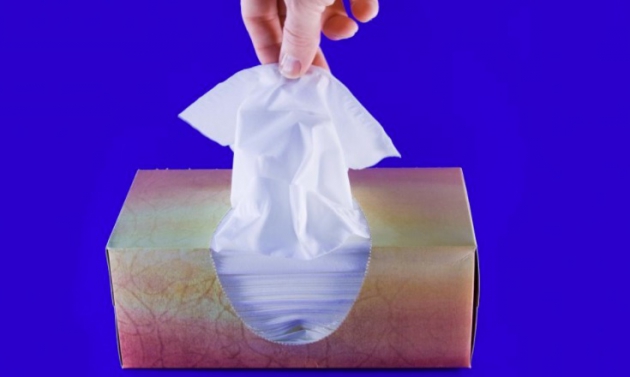Let’s face it; when allergy season arrives, it can result in a real loss it the quality of life. This is especially true when you add asthma or pre-existing respiratory diseases into the equation. If you suffer from a cough, stuffy nose, sneezing, itchy red eyes, and a sore throat during the summer months, the world outdoors can be intolerable. But, many of those allergy triggers are also present in our homes, including dust mites, pet dander, pollen, and others. In fact, studies have shown that in many homes the air indoors is more polluted than the air outside! Bad Indoor Air Quality (IAQ) keeps these allergy triggers around for longer giving them more opportunities to make you feel miserable. We don’t have much control over what happens outdoors, but we control the IAQ and allergy triggers in our own homes. Let’s take a closer look at how air cleaning can help allergy sufferers.
Mechanical Air Filtration
The best way to think about a mechanical air filter is as a physical protective barrier between the allergens and your AC system circulation. There are mechanical air filters in place in your HVAC system already, but they are not designed to trap allergens. The basic air filter is designed to trap particulates and prevent them from entering and damaging the sensitive components in your HVAC system. These particulates include dust, hair, and other debris, but not allergens, which are too small to be stopped by standard filtration media. If you’re interested in using mechanical air filtration to clean your air, you need air filters with a higher HEPA rating.
High Efficiency Particulate or HEPA filters are mechanical air filters designed to remove smaller particulates, including allergens. Although HEPA filters do prevent allergens from passing, they also attract them to the surface of the filtration media. Depending on the Minimum Efficiency Reporting Value or MERV rating, various types of particulates are entirely removed from the indoor air, and this improves the IAQ. The higher the MERV rating, the smaller the particles that it can remove, and the scale goes from 0-20. But, there is a caveat; because the higher HEPA rated filters stop smaller particles, they also slow down the air. So, you need a more powerful air conditioning system to force the air through the filter.
This is why you only find the top rated HEPA filters in use at laboratories, surgical centers, and clean rooms used to assemble sensitive electronic equipment. In a domestic capacity, a HEPA filter should have a MERV rating in the 5-8 range. This will be sufficient to remove allergens without making any major changes to your HVAC system and driving up your energy bills. There are many types of mechanical air filter products on the market, and choosing the right one can be tricky. Consult a local HVAC technician, and they can offer valuable advice on a mechanical air filtration system to meet your needs.
Electronic Air Cleaners
As the name implies, a filter can only trap a contaminant and physically prevent it from entering your indoor air supply. An air cleaner works in a very different and proactive manner by cleaning the air that passes through it. An electronic air cleaner creates an electrical field that ionizes any particulates that pass through it. When the particles become ionized, they are attracted to a pair of plates that are located inside the air cleaner. These particles are electrically charged, so they actually attract other smaller particles that continue to pass through the air cleaner.
As we mentioned earlier, without an industrial grade HVAC system, a home cannot use mechanical air filters with the highest MERV ratings. So, the highest quality HEPA filters are beyond our reach, and a MERV rating of 20 can remove bacteria! But, if you want to trap particles that are too small for a MERV rating up to 12 (superior for homes), an electronic air cleaner is a good addition. An electronic air cleaner does need an external power source of its own. It will consume energy, and this will be reflected in your energy bills. But, this is a great option to clean your air to a very high standard, and a local HVAC technician can help you to integrate it into your system.
Ultraviolet Lights
Although mechanical filters and electronic air cleaners can remove particulates, they cannot prevent the spread of living microorganisms. But, an ultraviolet lighting system acts as a germicide to kill microorganisms, including bacteria, viruses, cysts, and other pathogens that can multiply and populate your home. The UV light operates without harsh chemical odors spreading throughout your home, and it is extremely effective. The microorganisms are damage to prevent their ability to replicate, and this sterilization is key to the disinfection of your home. Most UV light systems can be installed in your return air ducts, and any microorganisms passing through are eliminated. The only regular maintenance required is to change the bulb when it burns out, and this is a simple task that requires no special skills.
Duct Cleaning
Over time your ductwork can get dirty. It may have mold growth and even pest invasions that degrade the IAQ in your home. This material, including dust, debris, and mold spores, will be added to the air coming from your vents. This will have a significant effect on allergy sufferers in your home, and because you are in a controlled environment, it can occur all year round. The best way to deal with this problem is to schedule some regular duct cleaning with your local HVAC specialist. They can clean away any debris, sanitize your ductwork, and make it fresh again. After duct cleaning, many people are astonished at the difference in their IAQ and how their allergies are diminished.
If you’re interested in improving the IAQ in your home, contact your local HVAC specialist. They can offer advice on the best method for your HVAC system, and they can inspect and clean your ductwork system.

